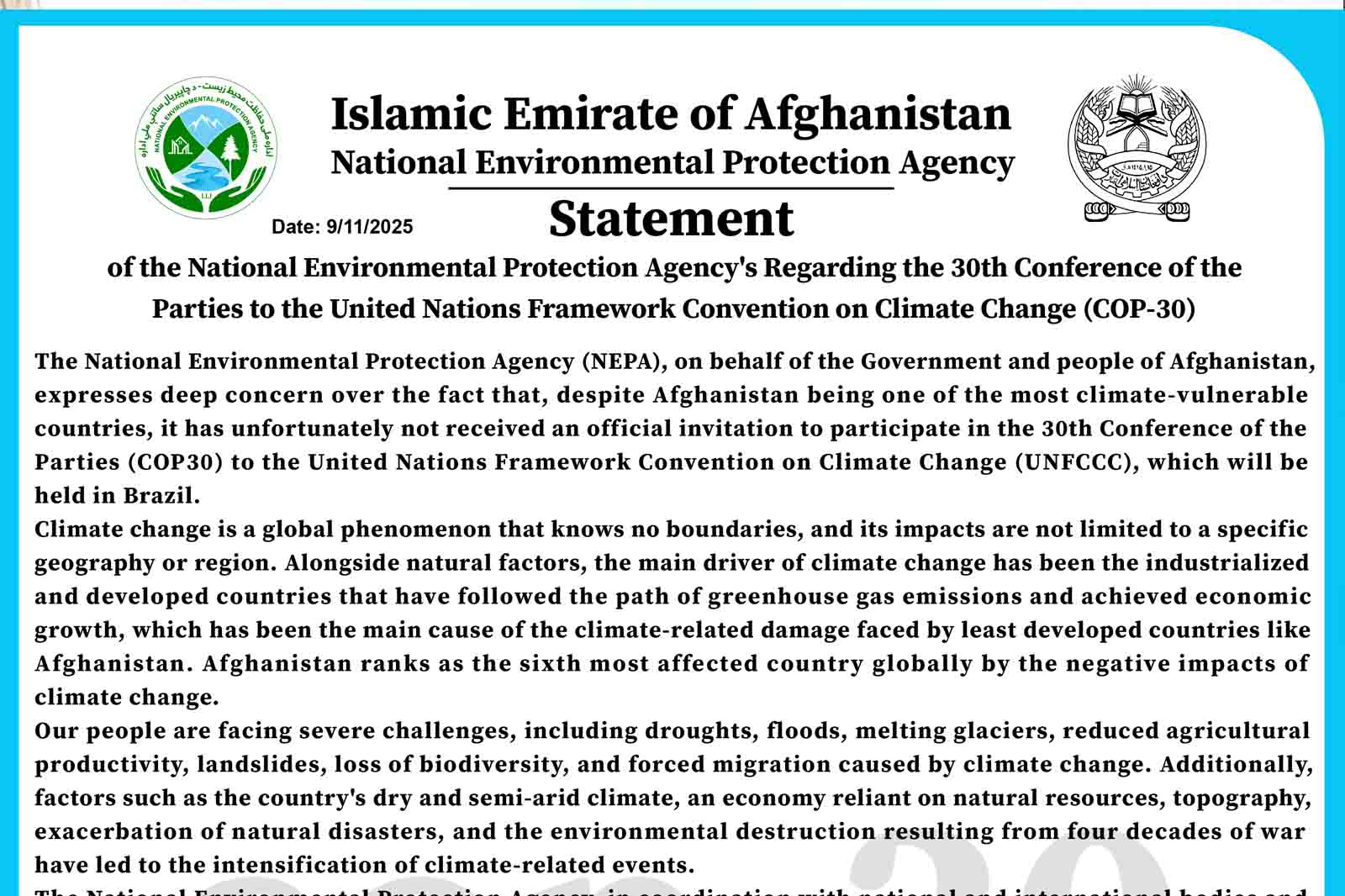تازه ها
Statement of the National Environmental Protection Agency's Regarding the 30th Conference of the Parties to the United Nations Framework Convention on Climate Change (COP-30)

The National Environmental Protection Agency (NEPA), on behalf of the
Government and people of Afghanistan, expresses deep concern over the fact that,
despite Afghanistan being one of the most climate-vulnerable countries, it has
unfortunately not received an official invitation to participate in the 30th
Conference of the Parties (COP30) to the United Nations Framework Convention on
Climate Change (UNFCCC), which will be held in Brazil.
Climate change is a global phenomenon that knows no boundaries, and its impacts
are not limited to a specific geography or region. Alongside natural factors,
the main driver of climate change has been the industrialized and developed
countries that have followed the path of greenhouse gas emissions and achieved
economic growth, which has been the main cause of the climate-related damage
faced by least developed countries like Afghanistan. Afghanistan ranks as the sixth
most affected country globally by the negative impacts of climate change.
Our people are facing severe challenges, including droughts, floods, melting
glaciers, reduced agricultural productivity, landslides, loss of biodiversity,
and forced migration caused by climate change. Additionally, factors such as
the country's dry and semi-arid climate, an economy reliant on natural
resources, topography, exacerbation of natural disasters, and the environmental
destruction resulting from four decades of war have led to the intensification
of climate-related events.
The National Environmental Protection Agency, in coordination with national and
international bodies and other relevant organizations, had made full
preparations to facilitate the participation of Afghanistan’s delegation in
COP30, to raise awareness about the vulnerabilities of the Afghan people to
climate change, to highlight the disregard for the environmental rights of the
Afghan people, and to bring attention to their exclusion from global climate
finance. However, the exclusion of the Afghan people from the right to
participate in this conference contradicts the principles of climate justice,
global cooperation, and human solidarity.
Afghanistan remains committed to its obligations under the UNFCCC and the Paris
Agreement.
It is important to note that in recent years, without receiving financial or
technical assistance from global climate finance mechanisms, Afghanistan, in
cooperation with relevant institutions, has finalized its Nationally Determined
Contribution (NDC-02), completed the Kigali Amendment plan, and formulated the
National Climate Change Strategy. Additionally, work continues on the
completion of Afghanistan's third Nationally Determined Contribution (NDC-03)
under the Paris Agreement.
We call on the United Nations, the international community, and relevant
organizations to recognize Afghanistan's legitimate rights and to ensure the
participation of Afghanistan’s delegation in such global meetings and
conferences so that the voices of millions of Afghans affected by climate
change can be heard by the world.
The failure to invite Afghanistan’s delegation to this conference and other
similar meetings demonstrates that the United Nations is not upholding global
justice for the Afghan people in the area of climate change. The people of
Afghanistan had the right to participate in this global forum and defend their
rights.
Afghanistan emphasizes the principles of climate justice, global cooperation,
and environmental protection and is ready to play an active role in global
efforts to combat climate change.
National Environmental Protection Agency of the Islamic
Emirate of Afghanistan